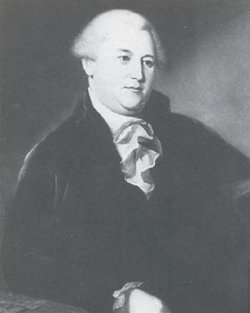Gunning Bedford, Jr.
|
|
Gunning Bedford, Jr. (1747 - March 30, 1812) was a politician and one of United States' Founding Fathers.
Gunning Bedford was the quintessential champion of the rights of the small states. His experience in local politics, along with his service in the Continental Congress, taught him much about the political and economic vulnerabilities of states like Delaware. Unlike some other small-state representatives who looked to the creation of a strong central government to protect their interests against more powerful neighbors, Bedford sought to limit the powers of the new government. But when the conflict over representation threatened to wreck the Constitutional Convention, he laid regional interests aside and, for the good of the country, sought to compromise.
| Contents |
Career before the Constitutional Convention
Bedford's family could trace its roots back to the settlement of Jamestown. He was a cousin of Colonel Gunning Bedford, a Revolutionary War hero and Delaware politician with whom he is often confused. Bedford attended the College of New Jersey (now Princeton) where he was a roommate of James Madison. After graduating in 1771, he studied law with Joseph Read, an influential politician with connections in both Pennsylvania and Delaware who would also sign the Constitution. Little is known about Bedford's early career until he opened a law practice in Dover, and then in Wilmington, during the later years of the Revolution. He sat briefly in the Delaware legislature during the early postwar period and represented his state in the Continental Congress (1783-85). He also served as the state's attorney general (1784-89). Although selected in 1786 to represent his state at the Annapolis Convention, Bedford was among those delegates who missed the sessions of that brief meeting. Evidence suggests that he shared the convention's concern with the political and economic problems associated with the Articles of Confederation, a concern that led the Annapolis delegates to call for what became the Constitutional Convention.
Contributions to the constitutional convention
Concerned primarily with the fate of the small states in a federal union potentially dominated by powerful, populous neighbors, the fiery Bedford warned the delegates at Philadelphia that the small states might have to seek foreign alliances for their own protection. At first he joined with those who sought merely to amend the Articles of Confederation, believing, as one delegate contended, "there is no middle way between a perfect consolidation [of the states into one nation] and a mere confederacy of the states. The first is out of the question, and in the latter they must continue if not perfectly yet equally sovereign." But when the idea of drafting a new Constitution was accepted, he supported the New Jersey Plan, a scheme that provided equal representation for the states in the national legislature, a point on which the Delaware legislature had instructed its delegates not to compromise. He called for strong limitations on the powers of the executive branch and recommended measures by which the states could maintain close control over the national legislature and judiciary, including the appointment of federal judges by the state legislatures. Bedford's speeches in support of these ideas led Georgia delegate William Pierce to describe him as a "bold" speaker, with "a very commanding and striking manner;" but "warm and impetuous in his temper and precipitate in his judgement." Realizing as the Convention sessions went on that unyielding adherence to his position would endanger the union, Bedford adopted a more flexible stance. He agreed to sit on the committee that drafted the Great Compromise, which settled the thorny question of representation and made possible the Convention's acceptance of the new plan of government.
Career after the constitutional convention
Bedford was a delegate to Delaware's ratification convention. Thanks to his efforts, along with those of John Dickinson, William Bassett, and others, Delaware became the first state to approve the Constitution. Resigning his post as Delaware's attorney general in 1789, he served that year and again in 1793 as a presidential elector, casting ballots both times for George Washington. Widely respected for his knowledge of the law, Bedford was asked by Delaware's senators and fellow signers George Read and William Bassett to review a bill, then under consideration, on the organization of the federal judiciary system. Bedford praised the document, which would become the Judiciary Act of 1789, one of the most important pieces of legislation of the period, as a "noble work;" but expressed some concerns as well. He admitted that the common law of the United States was difficult to define. "Yet;" he claimed, "the dignity of America requires that it [a definition] be ascertained, and that where we refer to laws they should be laws of our own country. If the principles of the laws of any other country are good and worthy of adoption, incorporate them into your own." He believed the Constitution's ratification had been the moment of "legal emancipation;" declaring that "as the foundation is laid so must the superstructure be built." In September 1789 Washington selected Bedford to be federal district judge for Delaware, a position he held until his death.
Bedford never lost interest in his local community. Believing the establishment of schools "is, on all hands, justly acknowledged to be an object of first importance;" he worked for the improvement of education in Wilmington. He was president of the Board of Trustees of Wilmington Academy, and when that institution became Wilmington College, he became its first president.
Reference
- Initial article adapted from public domain U.S. military text. [1] (http://www.army.mil/cmh-pg/books/RevWar/ss/bedford.htm)
| Preceded by: Joshua Clayton | Governor of Delaware 1796 – 1797 | Succeeded by: Daniel Rogers |

